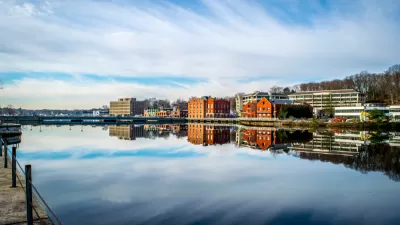Failing golf courses pose a choice for cities that can use tax dollars to turn them public or put the land to use in other ways.

A downward trend in business has lead many private golf courses to close in Illinois. The Chicago suburbs have seen a number of golf course closures, like "West of Geneva, Mill Creek Golf Club, centerpiece of a 2,100-acre subdivision, failed to open this spring. The struggling Big Run Golf Club in Lockport is applying for city water and sewer service and zoning for more than 500 homes. The Klein Creek Club in Winfield was taken over by lender Fifth Third Bank two years ago and is looking for a buyer," H. Lee Murphy writes for Crain’s Chicago.
The decline in golf isn't limited to Illinois. According to a 2019 report by the National Golf Foundation (an organization tasked with promoting and analyzing the sport) the number of rounds of golf played fell almost 5% between 2017 and 2018, though the report credits some of the decline to weather. The report does, however, admit that the country is oversupplied with golf courses, describing many of the closures as a market correction after a 20-year "building boom" in golf course construction.
As golf courses close in oversupplied parts of the country, other cities are evaluating the incentives to maintain their courses, as some argue the land used by golf courses could be put to better use. Murphy writes that subsidizing the conversion of private golf courses to public courses with taxpayer money could be a "toxic political issue."
FULL STORY: More private golf courses biting the dust

Study: Maui’s Plan to Convert Vacation Rentals to Long-Term Housing Could Cause Nearly $1 Billion Economic Loss
The plan would reduce visitor accommodation by 25,% resulting in 1,900 jobs lost.

North Texas Transit Leaders Tout Benefits of TOD for Growing Region
At a summit focused on transit-oriented development, policymakers discussed how North Texas’ expanded light rail system can serve as a tool for economic growth.

Why Should We Subsidize Public Transportation?
Many public transit agencies face financial stress due to rising costs, declining fare revenue, and declining subsidies. Transit advocates must provide a strong business case for increasing public transit funding.

How to Make US Trains Faster
Changes to boarding platforms and a switch to electric trains could improve U.S. passenger rail service without the added cost of high-speed rail.

Columbia’s Revitalized ‘Loop’ Is a Hub for Local Entrepreneurs
A focus on small businesses is helping a commercial corridor in Columbia, Missouri thrive.

Invasive Insect Threatens Minnesota’s Ash Forests
The Emerald Ash Borer is a rapidly spreading invasive pest threatening Minnesota’s ash trees, and homeowners are encouraged to plant diverse replacement species, avoid moving ash firewood, and monitor for signs of infestation.
Urban Design for Planners 1: Software Tools
This six-course series explores essential urban design concepts using open source software and equips planners with the tools they need to participate fully in the urban design process.
Planning for Universal Design
Learn the tools for implementing Universal Design in planning regulations.
City of Santa Clarita
Ascent Environmental
Institute for Housing and Urban Development Studies (IHS)
City of Grandview
Harvard GSD Executive Education
Toledo-Lucas County Plan Commissions
Salt Lake City
NYU Wagner Graduate School of Public Service




























